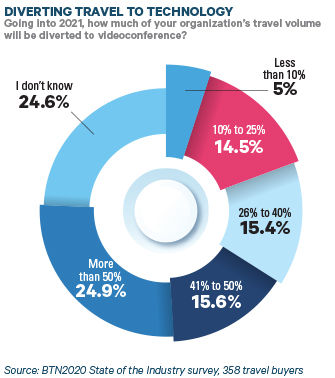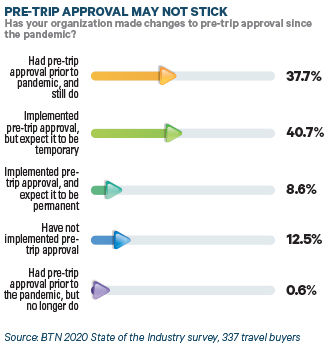The Covid-19 pandemic has forced employees, travel managers and C-suite executives to reassess the value of travel. Many have concluded that, despite avid use, virtual meeting platforms and remote teams may not be the ultimate future of the workplace. As often is the case, the latter group may be the most important convert to the church of conducting in-person business, and C-suite fervor for human contact may be shifting.


An October report from National Public Radio cited the CEOs of American Airlines, JP Morgan and Microsoft remarking on the shortcomings of virtual meetings. While American’s Doug Parker has a clear business bias toward fewer Zoom meetings, presumably Microsoft’s Satya Nadella, whose technology universe includes Microsoft Teams, does not. Nevertheless, among the three leaders, words like "awful" (Parker), "transactional" (Nadella) and lacking "creative combustion" (JP Morgan’s Jamie Dimon) typified their views of online meetings. Nadella went on to say, "30 minutes into your first video meeting in the morning … you’re fatigued," according to NPR.
Parker, for one, has suggested that the constant parade of Zoom meetings ultimately may result in a surge of business travel demand.
Perhaps not every CEO feels the same, but one thing’s for sure: In-person interactions—and often that means travel—have the attention of the C-suite as a productivity tool, as the vital connection for cementing relationships and as the flint in the "creative combustion" that drives innovation. Festive Road managing partner Caroline Strachan called on the cliché of the lovesick to describe the situation: "You don’t truly value something until you have it taken away," she said.
Now that it’s gone, though, "travel is within the full view of the C-suite," said Areka Consulting Americas managing partner Louise Miller, adding that it may be there forever.
So where does that leave the travel manager?
For the immediate term, travel program leaders have been tasked with getting travelers to articulate the need for in-person meetings and to justify their trips. More than 40 percent of travel managers surveyed by BTN said their companies are approving travel on a case-by-case bases. Under a quarter said their companies had defined what qualifies as essential travel and generally allow those trips.
Either way, pre-trip approval has become almost a de facto requirement across travel programs. Nearly 87 percent of travel managers surveyed currently have pre-trip approval requirements in place, whether they are automated as part of the booking workflow or implemented outside of the booking technology. Nearly 38 percent of respondents had pre-trip in place prior to the pandemic. Almost half of respondents have implemented it since the pandemic began. Among that half, however, only about 17 percent expect the pre-trip approval process to be permanent. We’ll come back to that later.
For the moment, it looks like the gatekeepers will remain and video meeting platforms will continue as travelers’ best alternative in 2021. A quarter of travel managers surveyed by BTN said they expect to divert 50 percent or more of their company’s would-be business travel to virtual meeting platforms in 2021—if they assume 2019 as a baseline for demand. Twenty percent of respondents said they would divert less than 25 percent of would-be travel to virtual connections in 2021; 30 percent said they would "Zoomify" anywhere from 25 percent to 50 percent of previous travel demand.
The Return to Travel Strategy
Returning even 50 percent of business travel to the market would be a huge boost for the industry READ MORE
Creating the Post-Covid Travel Program
For the travel that does return in 2021, programs are evolving, with a focus on communication, duty of care and a closer relationship with risk management partners. READ MORE
Bringing It All Together
With renewed attention from the C-suite and a laser focus on traveler care, has Covid-19 underhandedly delivered the support travel programs need to realize their best form in 2021? READ MORE